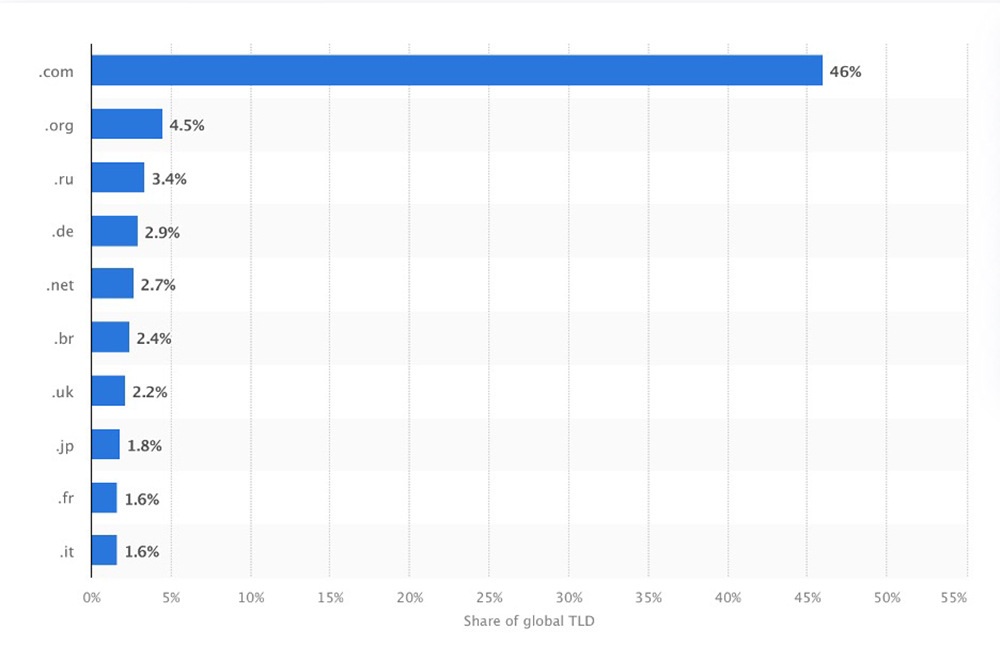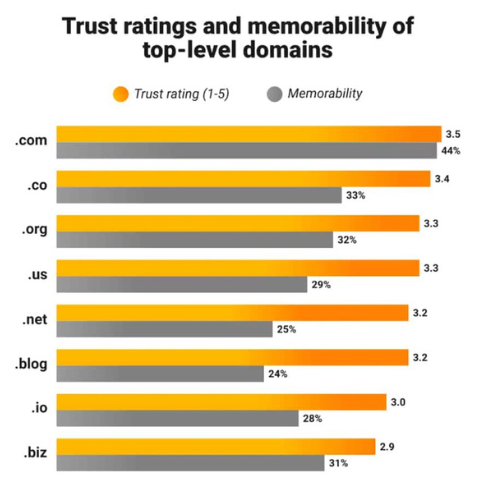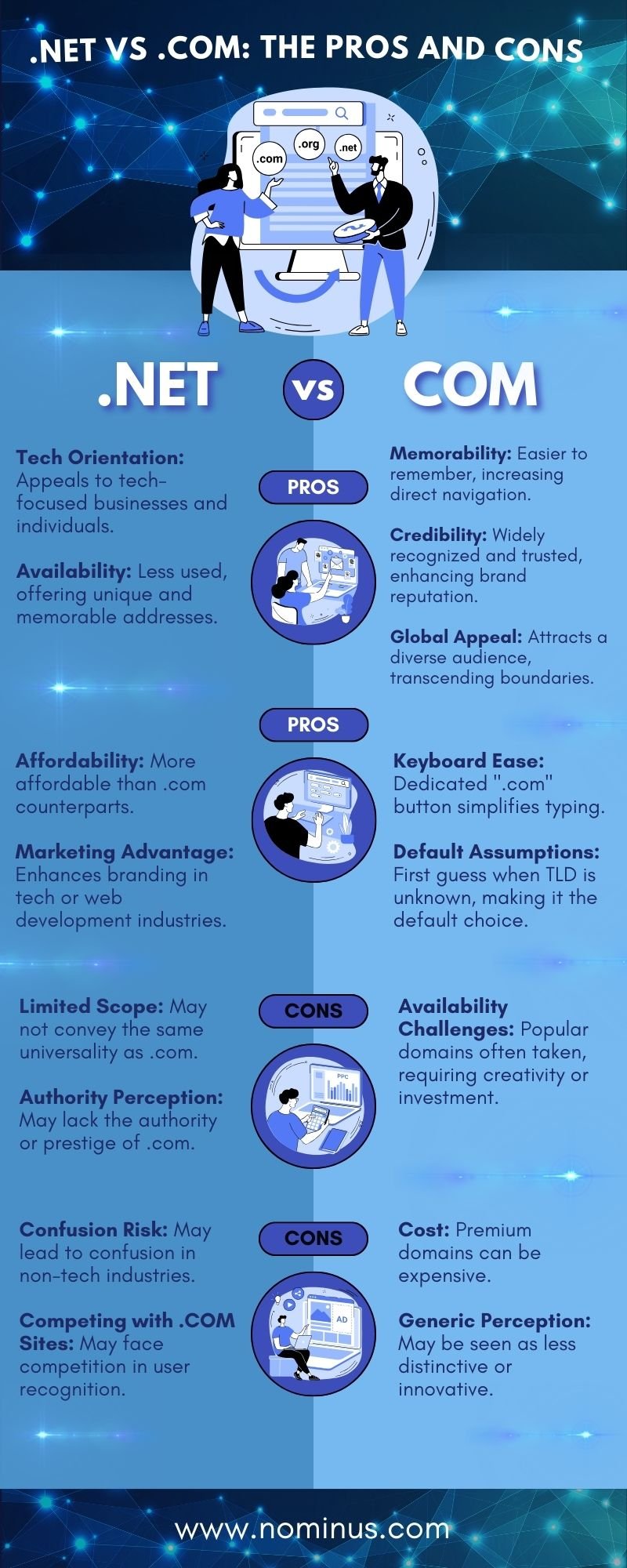.NET vs .COM: Which Domains Suit Your Business Best?
Table of Content
Introduction
Understanding Domain Name Extensions
What is .com?
What is .net?
What are the Key Differences?
.NET vs .COM: The Pros and Cons
Practical Considerations and Recommendations
Purchasing Your Domain
FAQs
Key Takeways
Introduction
In today's digital landscape, selecting the perfect domain extension for your business can feel like navigating a maze. With options aplenty and stakes high, the choice between .net and .com can seem daunting. Both renowned for their credibility and recognition, these extensions play a crucial role in shaping your online presence and influencing visitor perception. In this article, we'll delve into the nuances of .net and .com, aiding you in making the informed decision that best suits your business needs.
1. Understanding Domain Name Extensions:
Website addresses encompasses not only your website's name but also its extension, such as .net or .com. This combination serves as your virtual address, effortlessly directing visitors to your online presence while ensuring memorability. It's crucial for shaping user expectations, influencing perception, and targeting specific industries. A memorable domain extension enhances brand visibility, drives traffic, and ultimately increases brand awareness. With thousands of options available, certain top-level domains (TLDs) enjoy greater popularity than others.
-
.com: Derived from "commercial," .com is the most widely recognized and used domain extension, suitable for businesses of all types and sizes. It signifies a commercial presence on the internet and is synonymous with professionalism and credibility.
-
.org: Originally intended for non-profit organizations, .org has since been adopted by various entities, including community groups, educational institutions, and advocacy organizations. It conveys a sense of purpose and mission-driven focus.
-
.net: Rooted in "network," .net is closely associated with technology, networking, and internet-related services. It appeals to businesses and individuals in the tech industry and emphasizes innovation and connectivity.
-
.info: Designed for informational websites, .info domains are ideal for sharing knowledge, resources, and educational content online. They offer a platform for disseminating information and promoting transparency and authenticity.
-
.biz: Tailored for businesses and commercial ventures, .biz domains are suited for e-commerce platforms, online storefronts, and entrepreneurial endeavors. They emphasize professionalism and commerce-focused activities.
-
.co: Originally designated as Colombia's country code top-level domain (ccTLD), .co has gained popularity as an alternative to .com for businesses and startups. As well as being an acronym for “company”, it conveys a sense of innovation and modernity while offering a global reach.
Undoubtedly, .com reigns as the king of domain extensions. It's synonymous with the internet itself, embodying familiarity, credibility, and trust. When users encounter a .com website, they instinctively perceive it as reputable and established. This inherent trust can significantly impact click-through rates and search engine visibility.
Nevertheless, both .com and .net are popular choices for businesses. These extensions cater to specific industries and purposes, allowing businesses to communicate their brand identity effectively and reach their target audience online.
2. What is .COM?
.com, derived from "commercial," emerged as one of the internet's pioneering top-level domains. Renowned for its global appeal and versatility, .com remains the go-to extension for a wide array of organizations. Whether you're promoting events, selling products, or sharing personal insights through a blog or portfolio, .com offers unparalleled flexibility. Websites such as Google.com, Amazon.com, and Facebook.com exemplify the widespread adoption and success of .com domains.
3. What is .NET?
.net, which stands for "network", initially catered to entities in the tech and networking sectors. Nevertheless, its usage has expanded, and increasingly attracts innovators and creators drawn to its modern appeal. Ideal for businesses in technology, networking, or community-oriented ventures, .net domains convey a sense of tech-savvy sophistication. Platforms such as Behance.net foster a vibrant sense of community, embodying the collaborative spirit often associated with .net websites.
4. What Are the Key Differences?
While .com domains reign supreme, comprising 46% of all websites, .net occupies a smaller niche with just 2.7% usage. Despite their contrasting prevalence, both extensions offer distinct advantages.
 Figure 1 Most popular top-level domains worldwide as of December 2023. Source: Statista.com.
Figure 1 Most popular top-level domains worldwide as of December 2023. Source: Statista.com.
.com domains are synonymous with widespread memorability, credibility, and international recognition, making them the top choice for businesses aiming for broad visibility and trust among consumers worldwide. Their ubiquitous presence on the web enhances brand recognition and encourages higher traffic and engagement rates. While less prevalent, .net appeals to innovative, tech-oriented ventures seeking to convey specialization and expertise within their industries. With lower registration costs and a unique association with technology, .net domains cater to startups, software developers, and networking professionals looking to establish a digital footprint.

Figure 2. Trust ratings and memorability of top-level domains. Source: growthbadger.com.
Understanding the strengths and considerations of both extensions is crucial for businesses to make informed decisions aligned with their branding goals and target audience preferences.
5. .NET vs .COM: The Pros and Cons
.COM Pros
-
Memorability: .com domains are easier for users to remember, increasing the likelihood of direct navigation to your website.
-
Credibility: .com domains are widely recognized and trusted, instilling confidence in visitors and enhancing your brand's reputation.
-
Global Appeal: With its international recognition, a .com extension can attract a diverse audience, transcending geographical boundaries.
-
Keyboard ease: The dedicated .com button on many keyboards simplifies typing your web address, further enhancing user accessibility.
-
Default Assumptions: When individuals are unsure about a website's TLD, .com is overwhelmingly the first guess, solidifying its status as the default choice.
. COM Cons
-
Availability Challenges: Due to its popularity, many desirable .com domains may already be taken, necessitating creativity or financial investment to acquire the desired domain.
-
Cost: Premium .com domains can come with a hefty price tag, especially if they're in high demand or owned by domain squatters.
-
Generic Perception: As the most common domain extension, .com may be perceived as less distinctive or innovative compared to alternative extensions.
.NET Pros
-
Tech Orientation: .net domains naturally appeal to technology-focused businesses and individuals, signaling expertise and specialization in the tech industry.
-
Availability: With only 2.7% of websites utilizing the .net extension, securing a .net domain offers a unique and potentially more memorable web address.
-
Affordability: .net domains may be more affordable than sought-after .com counterparts, making them an attractive option for cost-conscious businesses.
-
Marketing Advantage: In certain industries, such as tech or web development, a .net extension can enhance branding and target audience perception.
.NET Cons
-
Limited Scope: While .net is well-suited for technology-related ventures, it may not convey the same level of universality or versatility as .com.
-
Authority Perception: .net domains may not carry the same level of authority or prestige as .com in the eyes of some users, potentially impacting brand perception.
-
Confusion Risk: In industries unrelated to technology, opting for a .net extension may lead to confusion or misperception among visitors expecting a more conventional domain. This can result in potential loss of traffic or missed opportunities for engagement if visitors assume your website is not relevant to their needs.
-
Competing with .com Sites: While .net domains offer their own unique advantages, they may face competition from .com sites in terms of user recognition and default assumptions. Visitors habitually associate websites with .com extensions, which may inadvertently divert traffic away from .net domains.
Despite these considerations, it's important to weigh the pros and cons of both .com and .net extensions in the context of your business objectives, target audience, and industry niche. Each extension offers distinct benefits and challenges, and the optimal choice depends on aligning with your branding strategy, market positioning, and long-term goals. By carefully evaluating these factors, you can make an informed decision that maximizes the effectiveness of your online presence and enhances your brand's visibility and credibility.

6. Practical Considerations and Recommendations
When deciding between .net and .com, consider factors like SEO impact, marketability, and brand alignment. While .com is often the first choice, securing both .net and .com extensions can bolster brand security and future expansion plans. Make sure to research extensively before taking a final decisions. Gatheing customer feedback by conducting surveys and polls can also help you make the right decision as well as provide potential prospects for your business and identify your competitors. You should also consult with domain registrars to ensure an informed decision aligns with your business goals.
7. Purchasing Your Domain
When ready to purchase your domain, opt for reputable registrars and web hosting services to ensure a smooth transaction and avoid potential pitfalls in the future, such as hidden costs. With both .net and .com extensions relatively affordable to register, consider investing in multi-year registrations to secure favorable pricing and future-proof your online presence.
Nominus is ready to guide you in this pivotal decision-making process. Our expertise ensures that your chosen domain extension, whether .com or .net, serves as a catalyst for your brand's digital journey, embodying its essence and aspirations in the vast expanse of cyberspace. After all, your domain is more than just a URL – it's the digital manifestation of your brand's narrative, poised to propel its growth and success.
8. FAQs
- Can anyone buy .com or .net names?
Yes, both .com and .net domain extensions are available for registration by individuals, businesses, organizations, and entities worldwide. There are no specific eligibility requirements to purchase a .com or .net domain name, making them accessible to anyone seeking to establish an online presence.
- Are there limitations with .net domains?
While .net domains are open for registration to the general public, it's essential to note that they are primarily associated with the technology and networking sectors. Therefore, businesses or individuals outside these industries may need to consider whether a .net domain aligns with their branding and target audience expectations.
- Is a .net domain name credible?
Yes, .net domains are considered credible and trustworthy, particularly within the technology and networking sectors. However, the perceived credibility of a domain name ultimately depends on factors such as the quality of the website content, the reputation of the business or individual behind it, and the overall user experience provided.
- How long does it take to register a .com or .net domain name?
The registration process for both .com and .net domain names typically takes only a few minutes once you've selected an available domain and completed the registration through a domain registrar. However, it's essential to note that domain availability and registration requirements may vary, potentially impacting the registration timeframe.
- Can I transfer my existing .com or .net domain name to a different registrar?
Yes, it's possible to transfer ownership of .com and .net domain names between different registrars. The process involves initiating a domain transfer request with the new registrar, which may require authorization from the current domain owner and adherence to specific transfer procedures outlined by the respective domain registries.
- How does domain name extension affect SEO?
The extension of your domain name has minimal impact on your website's search engine rankings. While .com is often perceived to have a positive influence, alternatives like .net can also rank well. However, country-specific extensions (CCTLDs) such as .uk may affect local search results due to increased click-through rates, but obtaining a ccTLD typically requires specific residency criteria. To improve ranking, it’s more important to include relevant keywords in your domain to clarify your business's focus to visitors. Ultimately, prioritizing a sustainable SEO strategy is vital for improving visibility on search engines.
Key Takeways
The choice between registering a .net domain or registering a .com domain.com hinges on your business's unique needs, target audience, and branding strategy. While .com reigns supreme in global recognition and versatility, .net offers a niche appeal often associated with tech-centric ventures but can also cater to a broader range of businesses and organizations. Ultimately, both extensions serve as pillars of credibility and trustworthiness in the digital realm, empowering businesses to thrive and connect with their audience effectively.
When choosing between .com and .net, several factors merit consideration:
1. Brand Identity: Reflect on your brand's essence and long-term objectives. Does it align more closely with the traditional ethos embodied by .com or does it exude a tech-forward, network-centric vibe suited to .net?
2. Market Presence: Assess your target audience and industry landscape. If your business operates in a tech-savvy domain or caters to a digitally literate demographic, .net might resonate more strongly with your clientele.
3. Availability and Cost: Evaluate the availability and affordability of your desired domain name in both extensions. While .com domains may command premium prices, .net offers a broader pool of options at potentially lower costs.
4. SEO Implications: Consider the SEO ramifications of your choice. While .com enjoys inherent advantages in search engine rankings, a well-optimized .net website can still achieve commendable visibility through quality content and technical prowess.